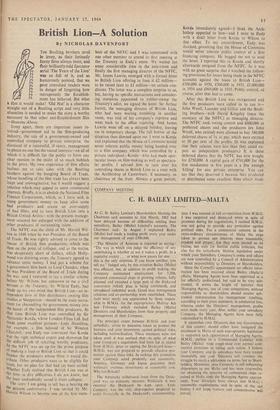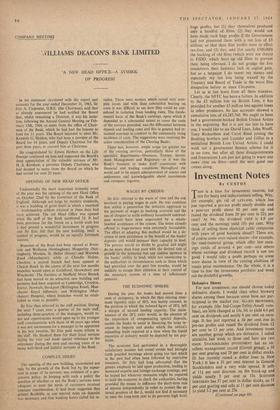British Lion—A Solution
By NICHOLAS. DAVENPORT Irony apart, there are important issues in- volved—government aid to the film-producing industry, the sale of a government-owned and controlled company to private enterprise, the dismissal of a successful, if saucy, management to please no one but the vested interests—on all of which it is difficult for the public to form any clear opinion in the midst of so much hubbub in the press. My own experience of film affairs inclines me to take sides with the Boulting brothers against the bungling Board of Trade, whose handling of the film trade has always been inept and unimaginative, but I would suggest a solution which.may appeal to some commercial interests. Briefly, it is to abolish the National Film Finance Corporation, which, as I have said, is using government money to keep alive some bad producers and create an over-supply of bad films, and to turn British Lion into a British United Artists---with the present manage- ment retained but enlarged with the addition of other producers of outstanding talent.
The NFFC was the child of Mr. Harold
son in 1948 when he was President of the Board of Trade. He was rightly advised to come to the rescue of British film production, , which was then on the point of collapse, and as the nation was desperately short of dollars, which Holly- wood was draining away, the Treasury agreed to advance some money. I had put a scheme for a government film bank to Lord Chandos, when be was President of the Board of Trade during the war, and I ventured to lay a similar scheme before, Mr. Wilson, but unknown to me a civil servant at the treasury, Sir Wilfrid Eady, had Made up his own mind that British Lion—an in- dependent lirm of film distributors owning film studios at Shepperton should be the main instru- ment for channelling the government money into the hands of the independent film producers. At that time 'British Lion was controlled by Sir Alexander Korda, whose London Films Ltd. had Made some excellent pictures---Lady Hamilton, for example, a film beloved of Sir Winston Churchill—and Eady was convinced that Korda was the right technical expert and showman for the difficult job of selecting worthy producers. So the NFFC was set up for the prime purpose of making a loan to British Lion so that it could finance the producers whose films it would' dis-, tribute. Other producers were to be eligible for loans, but no plan for that had yet been settled. Whether Eady realised that British Lion was at the time in dire difficulties I do not know, but the loan undoubtedly saved it from collapse. The story I am going to tell has a bearing on the present controversy. I was invited by Mr. Harold Wilson to become one ,of the first mem-
bers of the NFFC and I was summoned with
one other member to attend first meeting at the Treasury in Eady's room. We waited for some considerable time in the ante-room and finally the first managing director of the NFFC, Mr. James Lawrie, emerged with a formal letter to British Lion offering to loan it £2 million— to be raised later to £3 million—on certain con- ditions. The letter was a complete surprise to us, but, having no specific instructions and consider- ing ourselves appointed to rubber-stamp the Treasury's edict, we signed the letter. Sir Arthur Jarrett, the managing director of British Lion, who had been waiting trembling in another room, was told of his company's reprieve and went back to his office rejoicing, And James Lawrie went off on a delayed holiday, leaving me in temporary charge. The full horror of the situation then dawned upon me. I went to Korda and explained that the House of Commons would never tolerate public money being handed over to a film company which was controlled by a private individual—Korda— who had made spec- tacular losses on film-making as well as spectacu- lar profits. I advised him to turn over his controlling shares in British Lion to a trust with the Archbishop of Canterbury, if necessary, as chairman of the trust. Always a great patriot, Korda immediately agreed-1 think the Arch- bishop appealed to him—and I went to Eady with a draft letter from Korda to Wilson to that effect. To my astonishment, Eady was shocked, protesting that the House of Commons would never tolerate public control of a film financing company. He begged me not to send the letter. I reported this to Korda and shortly afterwards resigned from the NFFC. So it was with no great surprise that I watched the follow- ing provisions for losses being made in the NFFC accounts against the loans to British Lion— £500,000 in 1950, £500,000 in 1951, £1,000,000 in 1954 and £969,000 in 1955. Public control, of course, after that had to come.
After this British Lion was reorganised and the five producers were called in to run it— John Woolf, Launder and Gilliat and the Boult- ing brothers—with David Kingsley (once the secretary of the NFFC) as managing director. The NFFC took voting control and £600,000 in preferred shares and the producers (ex John Woolf, who retired) were allowed to buy 180,000 deferred shares of Is. at par, which were entitled to 50 per cent of the profits. (It was explained that their salaries were less than they could ex- pect as independent producers.) It is these deferred shares that the NFFC has now bought for £750,000. A capital gain of £741,000 for the five musketeers in five years is a fine enough 'killing' for any private enterprise. You can say that they deserved it because they produced or distributed some excellent films which made huge profits, but (1) they themselves produced only a handful of films, (2) they would not have made such huge profits if the Government had not presented them with a tax loss of £3 million, so that their film profits were in effect tax-free, and (3) they sold (for nearly £500,000) the backlog of old films (which were not theirs) to FIDO, which buys up old films to prevent their being televised. I do not grudge the five musketeers their fantastic luck in capital gain, but as a taxpayer I do resent my money and especially my tax loss being wasted by the Treasury and Board of Trade in the worst film dissipation before or since Cleopatra.
Let us at last learn from all these mistakes. Clearly, the NFFC has been a failure. In addition to the £3 million lost on British Lion, it has provided for another £3 million loss against loans to other producers. Its last accounts showed a cumulative loss, of £4,285,760. We ought to have had a government-backed British United Artists in the beginning. But it is not too late to have one. I would like to see David Lean, John Woolf, Tony Richardson and Carol Reed joining the Boulting brothers and Launder and Gilliat in a revitalised British Lion United Artists. I could work out a government finance scheme for it in no time, but after all these disappointments and frustrations I am just not going to waste any more time on films—until the next good one comes along.



































 Previous page
Previous page